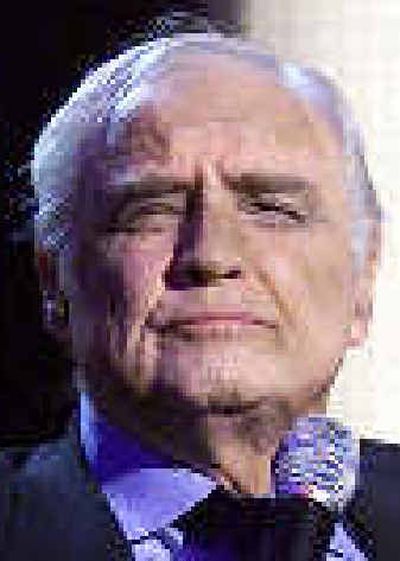Brando, rebel in art and life, dies at age 80

“The only thing an actor owes his public is not to bore them,” Marlon Brando used to say. And he didn’t.
In a 50-plus-year career of classic movies, legendary stage performances, film bombs and an often chaotic and eccentric private life, Brando was never boring.
The eight-time Oscar-nominated, two-time Oscar-winning actor died Thursday. His attorney would not disclose the cause of death. He was 80.
Brando made 39 films; among them he gave half a dozen of the greatest performances in screen history. He was good enough to become great and great enough to become an icon. And even if he seemed ready to throw it all away, repeatedly, and become an international punchline for his waistline and his eccentricity, the few great films he made remain a testament to a prodigious talent.
Brando was naive innocence betrayed in “On the Waterfront,” the embodiment of youthful rebellion in “The Wild One,” American superpower arrogance incarnate in “The Ugly American” and the disillusioned hangover from the sexual revolution in “Last Tango in Paris.”
He won his first Oscar for “On the Waterfront,” in which he played a young dockworker betrayed by his brother and his corrupt union, torn between his loyalty to them and his love for the sister of one of their victims, played by Eva Marie Saint.
“If there is a better performance by a man in the history of film in America, I don’t know what it is,” the late director Elia Kazan said of Brando in “Waterfront.” Kazan never took credit for that performance or Brando’s most famous scene from that film, a shared moment in a taxi opposite Rod Steiger, who played his brother.
“I coulda been a contender.”
Brando could do little wrong in the 1950s. When he climbed on board a motorcycle for “The Wild One,” American youth followed. That was the film with the famous generation gap exchange – “What’re you rebelling against?” “Whaddya got?”
He tried his hand at comedy, musicals and Westerns. He played a Nazi, a Mexican revolutionary, Napoleon and Marc Anthony. He even took on extra makeup and played Japanese.
He was on a roll, until he realized it. He first earned a reputation as “difficult” in the 1962 remake of “Mutiny on the Bounty.” Brando met two of his future wives on that shoot and commanded a then-astounding $1.25 million in salary. But his behavior on the set helped turn the film into a legendary career-breaker.
For years afterward, the flops outnumbered the hits. Then Francis Ford Coppola landed the elusive star for the title role in “The Godfather,” the 1972 classic adaptation of Mario Puzo’s novel, a film about the Mafia and the American dream.
Somewhere along the line, he developed a contempt for his profession that robbed him of the will to excel. From “Superman” onward, all Brando seemed to care about was his salary.
Yet few began their careers with more promise. He stormed the New York stage in the late 1940s. And from the instant he hit the screen, as a paralyzed World War II veteran in “The Men,” he heralded a new realism in film acting.
“Brando, as the veteran who endures the most difficult time, is so vividly real, dynamic and sensitive that his illusion is complete,” Bosley Crowther wrote is his review in the New York Times. “His face, the whole rhythm of his body and especially the strange timbre of his voice, often broken and plaintive and boyish, are articulate in every way.”
Within a couple of years, Brando was a huge star, his characteristic brooding, mumbled, naturalistic dialogue copied by every would-be Brando to come after him.
Marlon Brando was born in Omaha, Neb., on April 3, 1924. His mother was an acting teacher who worked with, among others, Henry Fonda. His parents, both alcoholics, split up and reconciled more than once. He wore the rebel label from an early age, thrown out of a military boarding school for insubordination. Part of his legend is that he was kicked out for riding a motorcycle through the halls.
His big break came when Kazan cast him as Stanley in the stage version of “A Streetcar Named Desire” in 1947. All slouching, slurring sexual menace in a torn T-shirt, yelling “STELLA!” to lure back his estranged wife, a star was born.
Since the 1970s, he’d taken to wildly eccentric public behavior, developing an outsize reputation as a crank to go along with his mercurial talent and his steadily increasing weight. He developed political interests and caused a stir by refusing the 1973 Oscar for “The Godfather,” and sending a Native American spokeswoman, Sacheen Littlefeather, to lecture Hollywood and the show’s TV audience about crimes against Native America. He tried to talk the producers of “Superman” into letting him play Superman’s father as a voice coming from a piece of luggage.
He had to testify in the murder trial of a son accused of killing Brando’s daughter’s lover. The daughter, Cheyenne, later killed herself.
His last months were sad ones, the tabloids tell us. He was diagnosed with heart problems, and a new biography, “Brando in Twilight,” reports that his son’s murder trial left Brando broke, surviving off his Screen Actor’s Guild pension.
Funeral arrangements are pending, but in an interview with the Times of London in April, Brando joked about how he’d like to be buried. He wanted Jack Nicholson to lead the mourners and asked that his ashes be scattered over the small Tahitian island he owned.
“A movie star is nothing important,” he told the Times. “Freud, Gandhi, Marx – these people are important. Movie acting is just dull, boring, childish work.”